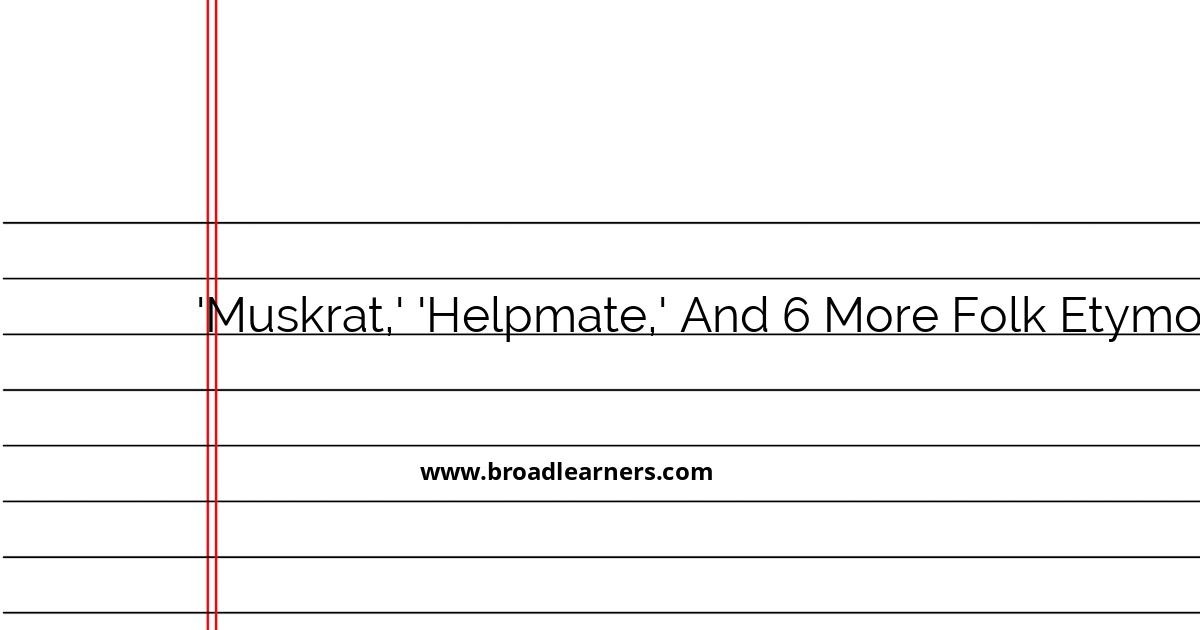Folk etymology refers to the phenomenon where the form of a word is changed over time due to a misinterpretation of its elements or historical background by speakers. This can lead to words that resemble more familiar terms but have uncertain or incorrect origins. In this article, we explore eight examples of folk etymologies, including 'muskrat,' 'helpmate,' and six more fascinating cases:
- 1. Muskrat
-
The word 'muskrat' is often thought to come from the rodent's musky scent. While this association seems logical, the name actually derives from the Algonquian word 'musquash.' Over time, English speakers morphed it into 'muskrat,' influenced by the belief that the animal's scent was a defining characteristic.
Example Usage:
The wetlands are home to various wildlife, including the distinctive muskrat, recognized by its characteristic smell and habitat.
- 2. Helpmate
-
'Helpmate' is a reformation of the original biblical term 'help meet,' which occurred due to a folk etymological misunderstanding. The term 'help meet' initially referred to someone suitably matched as a help to another, typically referring to a spouse.
Example Usage:
In times of need, a good helpmate can provide both support and companionship, ensuring mutual growth.
- 3. Crayfish
-
'Crayfish' originated from the Old French word 'crevice,' meaning a type of shellfish. The word evolved due to the English speakers' association with 'fish,' altering 'crevice' to the more familiar-sounding 'crayfish.'
Example Usage:
Louisiana cuisine is renowned for its flavorful dishes featuring crayfish as a central ingredient.
- 4. Bridegroom
-
The term 'bridegroom' comes from an alteration of the Old English word 'brydguma,' where 'guma' meant man. Over time, 'guma' was replaced by 'groom,' a more familiar English word.
Example Usage:
The bride and bridegroom exchanged vows in a beautiful ceremony that celebrated their union.
- 5. Chaise Lounge
-
Originally from the French term 'chaise longue,' meaning 'long chair,' the phrase was modified to 'chaise lounge' as English speakers associated it with relaxation and lounging.
Example Usage:
The sunroom's furniture includes a plush chaise lounge that's perfect for lazy summer afternoons.
- 6. Shamefaced
-
'Shamefaced' evolved from the earlier term 'shamefast,' where 'fast' in Old English meant fixed or firm. The current term came about through association with the expression of a shamed face.
Example Usage:
Feeling caught in the act, the child looked shamefaced and apologized for sneaking cookies before dinner.
- 7. Eskimo
-
The term 'Eskimo' originated from a French word 'esquimaux.' It was mistakenly believed to mean 'eater of raw meat,' but it likely came from the Montagnais word 'ayas̆kimew,' meaning 'netter of snowshoes.’
Example Usage:
The rich traditions of the Eskimo people have been celebrated and preserved through centuries of cultural storytelling.
- 8. Sand Blind
-
'Sand blind' is an alteration of 'samblind,' where 'sam' means semi or half. Folk etymology changed it to refer to being blinded by sand.
Example Usage:
The adventurer found himself momentarily sand blind during the desert storm, struggling to find his way to shelter.
These examples of folk etymology demonstrate the fascinating ways in which language evolves and adapts based on popular misconceptions or associations. Understanding these transformations enriches our appreciation of linguistic history and development.

Did I miss anything? Respond below